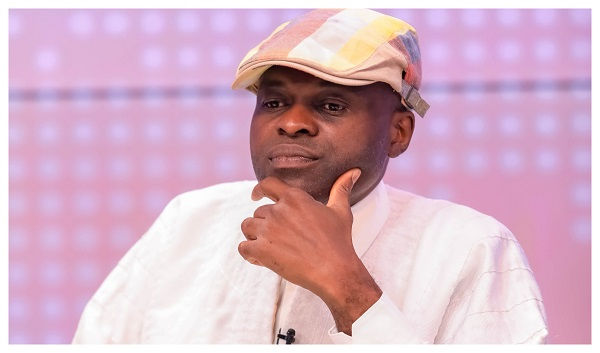Chief Justice accused of falsifying Judges' murder records for sympathy
Lawyer and activist, Oliver Barker-Vormawor, has accused suspended Chief Justice Gertrude Torkornoo of misrepresenting historical facts for political gain, following her recent comments regarding the infamous June 1982 murders of three High Court judges and a retired army officer.
In a strongly worded Facebook post shared on June 26, 2025, Mr Barker-Vormawor, described the Chief Justice’s remarks during her press conference as, “irresponsible” and a distortion of the historical record.
According to him, the Chief Justice claimed she was, “traumatised by Adu Lodge” because it “featured very prominently in the planning of the murder of judges on 30 June 1981.”
He refuted this claim as “absolutely incorrect.”
Interestingly, The Herald’s findings indicate that Adu Lodge, which the suspended Justice Torkornoo, characterised as a location tied to a national tragedy and thus haunted, has recently undergone significant refurbishment.
It was commissioned in December last year by then-President Nana Akufo-Addo, following its rehabilitation by the Ministry of Foreign Affairs.
At the commissioning ceremony, then-Minister for Foreign Affairs and Regional Integration and now Secretary-General-elect of the Commonwealth of Nations, Shirley Ayorkor Botchwey, stated that the renovated A.L. Adu Lodge, would serve as a reliable venue for diplomatic activities in Ghana.
“I have spent my time this morning reading the report of the Special Investigative Branch and the Attorney-General’s comments on the report to fact-check the Chief Justice,” Mr Barker-Vormawor wrote.
“Adu Lodge was at no point mentioned, used for, or connected in any way with the planning or execution of the murders.”
He acknowledged that the Lodge was indeed mentioned in the report but explained that its reference was incidental and unrelated to the planning of the murders of High Court judges Justices Fred Poku Sarkodee, Cecilia Koranteng-Addow, Kwadwo Agyei Agyepong, and retired army officer Major Sam Acquah.
“Amartey Kwei, one of those later convicted and executed for the murders, claimed that the late Captain Kojo Tsikata met him at Adu Lodge on 31 October 1982 – well after the murders, which took place on 18 June 1982,” Barker-Vormawor explained.
He further clarified that the meeting, as documented in the investigative report, centred on Captain Tsikata’s alleged concerns about what Amartey Kwei might reveal to investigators, rather than the planning of the crime itself.
“Amartei-Kwei, one of the people who was later convicted and executed for the murders, claimed that Capt Kojo Tsikata met with him there on 31st October 1982 to find out what he intended to tell the investigators, and express his concern that he doesn’t go and say anything that can be interpreted to cause the collapse of the 10 months old Government.
“The murders happened on 18th June 1982. And so Adu Lodge was nowhere near or connected to those murders. Its mention was tangential.
“Our History may not be pleasant, but let’s not falsify it in the service of an immature, self-serving agenda! That’s how a whole generation was raised to hate Nkrumah”, adding, “To now claim that Adu Lodge was the epicentre of planning is to distort history for sympathy votes,” he declared.
Mr Barker-Vormawor cautioned against rewriting painful chapters of Ghana’s history to suit “an immature, self-serving agenda,” drawing a parallel with what he described as past misrepresentations used to vilify Ghana’s first President, Dr Kwame Nkrumah.
“Our history may not be pleasant, but let’s not falsify it,” he concluded. “Irresponsible!”
During the commissioning of the renovated A.L. Adu Lodge in Accra on Monday, 23 December 2024, President Akufo-Addo described the occasion as a significant diplomatic milestone.
“This occasion is particularly meaningful to me because it is one of the final diplomatic milestones of my tenure as president. Over the past eight years, we have worked tirelessly to strengthen Ghana’s international partnerships and raise our nation’s global profile,” he said.
Highlighting what he saw as one of his administration’s achievements, he stated: “Amongst our many successes, one that stands out is the election of Honourable Shirley Ayorkor Botchwey, Minister for Foreign Affairs and Regional Integration, as the next Secretary-General of the Commonwealth of Nations.”
“Her leadership builds on the proud legacy of A.L. Adu, who served as the first Deputy Secretary-General of the Commonwealth Secretariat, a legacy Ghana continues to cherish,” Akufo-Addo added.
Commenting on the purpose of the refurbished facility, President Akufo-Addo said: “The A.L. Adu Lodge is a gateway to possibilities. It has been designed to accommodate Ghanaian and foreign diplomats alike and to host fora, conferences, and dialogues that can shape the future of Ghana and indeed the world.”
He described the lodge as “a beacon of Ghana’s commitment to fostering collaboration and addressing global challenges,” pointing to its 15 presidential suites, modern meeting rooms, and cutting-edge translation services.
The President also emphasised the historical significance of the lodge’s location: “Nearby is the Osu Christiansborg Castle, a fulcrum of Ghana’s colonial struggle and, for a time, the seat of national administration. Also close are landmarks like the Nationalism Park, which commemorates the 28 February 1948 crossroads shooting that fuelled our march to independence, and the proposed Heroes Park, the future resting place of historic Ghanaian figures, including Dr Kwame Nkrumah and Prof. John Evans Atta Mills.”
“Standing here, I feel the presence of history all around us,” the then President remarked. “This diplomatic lodge is a testament to what we can achieve when we work together with vision and purpose.”
Ms Ayorkor Botchwey, for her part, reiterated that the refurbished Lodge would serve as a vital space for Ghana’s diplomatic engagements. She expressed her appreciation to Foreign Service staff, contractors, engineers, artisans, and consultants who contributed to the timely completion of the project.
Chief Justice Gertrude Torkornoo was suspended on 22 April 2025, following the receipt of three petitions alleging misconduct, and a five-member committee was established under Article 146 to investigate the claims.
On Wednesday, she addressed the nation on 25 June, describing the proceedings as “secretive,” “opaque,” and in violation of due process principles such as legal representation, family presence, charge disclosure, and dignity, including invasive searches.
Justice Torkornoo has formally applied to the Supreme Court to have her hearing moved into public spaces to ensure transparency, but her request was refused.
Refusing to resign, she insists that stepping down would legitimise the process: “My resignation will be an admission that this flawed process is acceptable”.
She warns that the way her case is handled threatens judicial independence and sets a dangerous precedent for other high officials under Article 146.
The Chief Justice’s controversial remarks have ignited significant public debate, particularly over how the judiciary engages with its own history and the legacy of the 1982 murders, widely regarded as one of the darkest moments in Ghana’s legal and political history.
At the press conference, Justice Torkornoo questioned the venue of the ongoing Article 146 proceedings, which are being held in a high-security zone on Castle Drive, Osu, a departure from the usual Judicial Service premises.
“It is clear that the choice of venue, against the background of the secrecy of proceedings, was intended to intimidate me and to prevent any citizen of Ghana from knowing how the proceedings are being conducted,” she claimed.
“I need to disclose at this point that the Adu Lodge facility, where I am being tried, featured very prominently in the planning of the murder of Judges on 30 June 1981. This can be verified in the Special Investigative Report on that terrible event in our national history.”
She added: “It will be recalled that Major Sam Acquah, the military officer who was killed alongside the three High Court Judges, had been the Director of Human Resources of GIHOC. He was my uncle and guardian when I entered the University of Ghana in September 1980. I was living with him at the time he was abducted and murdered. Was Adu Lodge chosen for this inquiry to make me feel insecure? I think so.”
Justice Torkornoo further expressed frustration with the manner in which the proceedings were being conducted.
“No rules provided by law that regulate hearings and trials in this country are being followed,” she stated. “When a citizen is summoned before a court or any disciplinary committee, it is the duty of the court or committee to provide them with a copy of the complaint or petition. This has not been done.”
She revealed that the committee had refused to give her copies of the petitions that formed the basis of the inquiry, despite the President having referred them.
“They claim I received copies from the President on 27 March 2025, so they don’t need to serve me again. They have also refused to serve the petitioners. For this reason, I have yet to receive any formal notification of the specific charges against me.”











